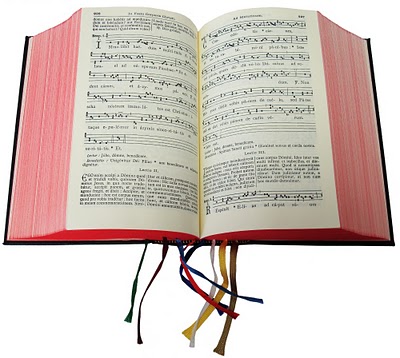The first time someone show me the Liturgy of the Hours my first thought was, “you must be joking.” I couldn’t understand why anyone would choose to pray in such a complicated way. My Bible had one ribbon, this thing had half a dozen and the person had put bookmarks in it to boot. At that point my response was thanks, but no thanks.
In the next few years I came to realize that I could use more prayer in my life, and I bought my own copy of Christian Prayer and started trying to decipher it’s pages. After many attempts and defeats to try to figure it out on my own I borrowed a copy of The Divine Office for Dodos, and was finally able to make it through the prayers. It didn’t take long for me to realize that every group of people I met with did the Liturgy of the Hours a little different.
Some would throw in antiphons after every line, others would use them as book ends at the beginning and end of every psalm. Some would pray all the days for saints, others wouldn’t even pray through feast days. If times of silence were taken, when they were taken varied frequently. One of the first groups I prayed with was a group of Charismatic Catholic men. This group would break into glossolalia between the intercessions and the Lord’s prayer. I began to realize that Liturgy of the Hours, like all prayer is not a static recitation of words but a vibrant expression of the faith of the church, as well as the community or the participants.
If you’ve gotten over the hump of trying to decipher how the Divine Office works here are ten ways I’ve found to add vibrancy to your daily prayer…
- Do the work of liturgy – Liturgy means, “the work of the people.” To pray through the liturgy is too engage in the work of God in many ways. One thing I try to do is determine what work is to be done in each prayer, psalm, or antiphon. When we are called to worship God lift up your heart. When we are called to intercede, sometimes it is best to have a person or situation in mind. There are many times when we call creation to worship, at this time realize you are a true priest to this world called to lead all creation in a liturgy of praise. Sometimes we are recalling the things God has done; at this point join with the church throughout the ages in thanking God.
- Research the saints and feasts – There is a great wealth of church history, wisdom and theology in each of the days set aside in the Divine Office. If a day is set aside for a person or event, take time and learn why. For me this is a great source of encouragement.
- Learn to chant – Chanting the psalms is a great experience, and there are tons of great ways to do it. I have been learning how using the free workshops at http://ancientfaith.com/podcasts/glorytothee but there are plenty of other resources available. Try it!
- Pray with others – This perhaps should be the first one. I love praying with others in the liturgy. When I don’t have anyone with me I sometimes imagine praying with all the others around the world praying at the same time. When my wife is out of town we will often pray the Divine Office together over the phone.
- Take time for silence – One thing that is clear in the instructions for the Divine Office is that there needs to be time for prayer. Take this time… I like to take it a few times over the course of each office. Listen for what God is saying. Be present in love to God.
- Lectio Divina – One thing I really like to do is pray through the scripture reading as an abbreviated Lectio Divina prayer. I will pray through the reading twice then pray out one word or phrase that stands out a few times. Then I wait and listen to hear what God has to say about it in my heart.
- Hold it with you throughout the day – Take something with you when you leave. I try to keep in mind at least one thing from each prayer time with me at all times between prayers. If I am praying with others I take time after prayer to talk about what God was doing in my heart when we are done. Prayer offers us great riches. I don’t leave home without my wallet, and I don’t leave home without my prayer.
- Create sacred space – I have created space both at home and at work for my prayer. It helps me find peace and enter into prayer more quickly and deeply. I don’t always have the ability to pray in sacred space. But when I can, I use it.
- Be creative – There is space for creativity in the Liturgy of the Hours. When there are hymns I sometimes sing original songs. I like to write music to go along with the psalms. I also like to incorporate elements, songs, and expressions of my faith community into the prayers.
- Pray for what matters to you – I take time during intercessions to lift up my prayers for the day. It helps ground me in my dependence for God, and reminds me of the real needs of those in my life who I am praying for.
I personally use the Divine Office, which is Roman Catholic. But Orthodox, Anglicans, Lutherans, Methodists, and many others have their own Liturgy of the Hours. I have used most of these at least a couple times and they are all great. Most will be able to implement all ten of these tools as well. I have found such amazing life and depth in praying the Liturgy of the Hours I will keep on praying, and am always looking for people to pray with. If anyone is interested in joining me… give me a call.

















